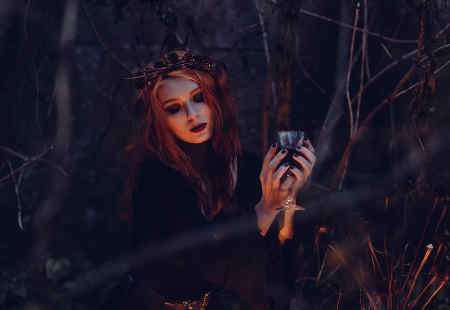
When I look through books or websites about magic, I often see various things labeled as white or black magic. Or sometimes even grey magic! But what is the difference between these types of magic?
What’s the difference between black and white magic? White magic is done with good intentions to try and help others, without expecting anything in return. Black magic is done to harm, or indirectly causes harm in the process. Gray magic falls in between, and includes anything done for material gain or selfish reasons.
In this article, I’ll explain the differences between black, white, and gray magic. Plus I’ll discuss if these are real categories, or just something arbitrary.
Distinguishing Between Black Magic and White Magic
When you start to look through the literature, it can seem kind of arbitrary what gets labeled as black magic or white magic. White magic is also sometimes referred to as high magic, and black magic is called low magic.
Sometimes black magic is looked down upon as something that is evil and there are strong warnings against using it. Other times it’s valued and considered an especially strong type of magic.
Magician practitioners can make a choice to only practice white magic, to only practice black magic, or to do both. Some don’t draw any distinction at all and just lump everything together as magic.
So things aren’t always as “black and white” as they might seem!
What Is White Magic?

One of the primary rules of Wicca is to “harm none.” So some practitioners may consider themselves “white witches” and take this rule very seriously.
White magic can be seen as magic that is positive and provides a benefit, and doesn’t do any harm to any living thing.
Some magicians or witches will take this a step further and say that white magic is only magic that is done for selfless purposes. So this would exclude any spells done for your benefit like money spells, even if no one is harmed in the process.
Those who practice white magic are typically healers, shamans, and those that create charms or blessings for others. Generally most kinds of ceremonial magic are seen as white magic as well.
Some other things usually considered white magic include purification, attracting positive influences, driving away evil forces, and attempting to gain divine knowledge.
Like everything, there are varying degrees of white magic and some people are more purists about it than others.
You can compare it to something like being a vegetarian. Some people who call themselves vegetarian will still eat fish. While others are more strict and will lean toward veganism and not even eat animal products like milk or honey.
This analogy can be applied to magic, and there are a wide spectrum of what different people would classify as “white” or “black” magic. The more extreme examples are clear to define, but there is a lot of murky area in the middle.
There is particularly a lot of debate about whether it’s still white magic once money is involved and you’re charging for your services. Are tarot readers, psychics, and witches who sell spells to other people performing white magic? In the end, you will need to decide for yourself.
What Is Black Magic?
At its worst, black magic is typically magic done for malicious reasons. It involves doing harm, either directly or as a means to an end. When black magic is mentioned, it often conjures up images of things like demon worship and human sacrifice to some people.
Things like making voodoo dolls to get revenge on someone is pretty clearly black magic. But it might include less obvious things. Some people might consider love spells to be black magic. That’s since you’re trying to influence someone and make them do something that they might not naturally want.
What is considered black magic will depend mainly on your culture, religion, and other factors. During the crusades, Salem witch trials, and other times in history, all magic was regarded as black magic or evil.
During the early days of Christianity, many societies tried to remove existing pagan cultures or any other religious practices that could be considered magic. People who were formerly considered seers or sorcerers and held a positive place in society were suddenly cast in a negative light and blamed for things like crop failures and disease. Magic was believed to be of the devil and a way of unleashing evil onto the world.
Whereas white magic would be used to lift curses, black magic can be used to place curses on people. All kinds of illness, injuries, or bad luck are often blamed on black magic.
For some magic practitioners, even casting hexes or curses may not necessarily be considered black magic. It’s all about intention. Some might find these kinds of spells self-defense and see them as okay to use against someone who is causing them harm. Like everything else we’ve talked about, there are varying degrees of this. Casting a binding spell would be considered more acceptable than most people than actively wishing harm on someone or their property.
Voodoo is almost exclusively considered a form of black magic. Learn more about it from my article Voodoo Loa. The Beliefs, Magic, Gods, and Spirits of Haiti

What Is Gray Magic?
When something isn’t exactly right or wrong, we say that it’s a gray area. That’s exactly how you can think of gray magic. It isn’t necessarily done with the purest of intentions, but it also isn’t evil or actively doing harm either.
Gray magic might be magic that you do for selfish reasons, material gain, or otherwise to have an affect on the world.
Some people consider anything you do that benefits you to be gray magic, even if your intentions are good.
That might include love spells to try and attract a partner, using magic to try and find a job or get a raise at work, protection spells to prevent yourself from getting harmed or sick, and lots of other things. Some people might even consider using healing spells on yourself to be a form of gray magic.
Depending on your beliefs, gray magic can include almost anything that isn’t done with completely selfless intentions on one end, or actively harming people on the other.
I would consider scrying mirrors to be a form of gray magic. Want to make one of your own? Learn how from my article Scrying Mirrors: What Are They, and How To Make and Use Them
Should People Distinguish Between White and Black Magic?
While some people label themselves as practitioners of black or white magic, this distinction isn’t really necessary. If it helps you to use these terms, feel free to keep using them. But at the end of the day, just follow your own heart and do what you think is right.
There’s no such thing as a white hammer or a black hammer. It’s just a hammer. You can choose to use it constructively to build things, or you could use it to hit someone in the head with (definitely not recommended!) My point is, I consider magic to be just like a hammer. It’s a tool that you can either use for good or bad. It isn’t necessarily a bad thing in and of itself. It depends what your intention for it is, and how you choose to use it.
At the end of the day, you will have to live with your conscience and the karma of what kind of magic you do. You’ll have to decide for yourself what you consider to be moral and good or bad or not. Are you willing to hurt people who hurt you, or will you look for less harmful alternatives? Will you use a money spell when you can’t afford to pay your bills? Magic is a deeply personal thing for you to decide for yourself.
Conclusion
There is no definitive guide to say what is black or white magic.
Generally, white magic is seen as magic done with pure intentions to try and help or heal the world. Black magic is magic that’s done to hurt or that causes hurt indirectly.
Sometimes black magic is seen as stronger and white magic is seen as weaker, but that isn’t necessarily the case.
In the end, you’ll need to decide for yourself what you consider to be black or white magic, or if you feel the need to make a distinction between different types of magic at all!
Personally I think magic is magic. It’s just a tool, and it depends more on what your intentions are and how you use it, not what a particular spell is.